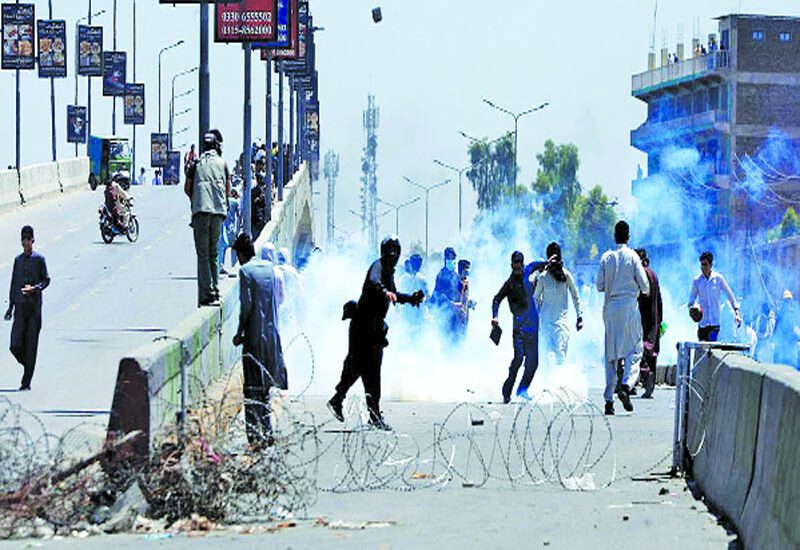The implications of Pakistan’s implosion
- July 3, 2023
- Posted by: admin
- Category: Pakistan

By: Deepak Sinha
Much like in Pakistan, religion and ethnicity are increasingly seen as tools to spread divisiveness aimed at fulfilling political agendas
As we watch Pakistan crash and burn on live television, it is too early to say if we are witnessing the beginning of the end or just the end of the beginning. Even in this age of misinformation and deep fakes what can be said with certainty is that, much in the manner of Humpty Dumpty, Pakistan has had a great fall and all the Imrans, Shariefs, Bhutto’s and Asims put together, can never make Pakistan whole again.
Of course, none of this was unexpected. We have seen Pakistan slowly go bankrupt, with inflation soaring and its currency collapsing as the impact of climate change, the pandemic, endemic corruption and sheer mismanagement have taken their toll, leaving its economy in tatters. While always known for its rather rumbustious politics, with opposition parties at each other’s throats and the military always looming over their shoulders, this time things seem a bit different.
For one, the Army’s image has been badly scorched with public accusations of corruption against the top brass, which has lost much of its public support and created cracks within its ranks. Now, as per unconfirmed reports, dissensions at the very top, have adversely impacted its cohesion. Add to that increasing terror attacks by the Pakistani Taliban (TTP), radicalisation within and troubles in the provinces, especially Balochistan. All in all, it has been lashed by a perfect storm for some time now, and something had to give. So, it did, with Imran Khan’s arrest becoming the hair that broke the proverbial Camel’s back.
From our point of view, Imran Khan’s arrest is not a bad thing. The charming, affable fun-loving cricketer of yore is long gone. Replaced by a born-again religious zealot who sees India as fair game and the stepping stone to fulfilling his ambitions of leading Pakistan once again. While he and his Pakistan Tehreek-e-Insaaf (PTI) are extremely popular, taking on the Army publicly and showing its vulnerabilities is bound to end with a loss for all parties. In the circumstances, we obviously must err on the side of caution and be on the alert, as a terror strike against us to divert attention cannot be ruled out.
Apart from the childish desire to gloat at the situation Pakistan finds itself in, some issues of consequence emerge which we would do well to give serious thought to. Some worry, and rightfully so, that instability and the emergence of a failed state with nuclear weapons on our doorstep places us in a very tenuous security situation. Unfortunately, there is little we can do about that except guard our borders with even more care and leave it to those who have influence there, the United States and China, to neutralise the nuclear issue, as not only were they both complicit in Pakistan turning nuclear but are also not safe from what may occur there if that country becomes unmanageable.
The emergence of Bangladesh ushered in the death knell of the “two nation theory” which we believed had been formulated and promoted by Jinnah and had resulted in Partition, the prime reason for all our troubles since then. Nothing could be further from the truth and Jinnah was, in fact, only a cat’s paw for the British. As Narendra Sarila, former diplomat and author of The Shadow of the Great Game: The Untold Story of India’s Partition, puts it,
Partition was only just a means to an end for the British and Americans to pursue and protect their strategic interests in the region. As Prof. Antony Copley’s review of the book states: “With imperial control of the subcontinent clearly at an end (even if Linlithgow doubted this and Churchill even more so) Britain’s primary consideration became one of defence of her strategic interests in Persia and the Middle East together with meeting any post-war threat from the Soviet Union and China.
The Post-Hostilities Planning Staff of the Cabinet alerted Churchill to this need on 19 May 1945, it was echoed by the British Chiefs of Staff on 18 April 1946, and all were endorsed by Wavell and Auchinleck. Pakistan and partition were seen to be the answer and Attlee merely followed suit. Possibly Congress’s betrayal in 1942 pointed to Pakistan as the best prospect for Britain’s strategic defence needs though it was hoped these would be strengthened were India to be persuaded to join the Commonwealth. Here was indeed the future of the Baghdad pact and CENTO.” This British strategy, in retrospect, badly backfired, putting themselves at greater risk and now adding to Pakistan’s irrelevance.
Finally, what is most pertinent for us from these events in Pakistan is that they can well become a precursor of what we are likely to face in the not-too-distant future. Sadly, our developmental models since Independence have been quite similar little emphasis or attention given to education or health. Much like in Pakistan, religion and ethnicity are increasingly seen as tools to spread divisiveness and exclusion aimed only at fulfilling political agendas with little thought for our future. Clearly, without changes we are heading down that same road and it will be our future generations who will confront the same ignominy and shame that stare Pakistanis in the face today.
(The author, a military veteran is a Visiting Fellow with the Observer Research Foundation and a Senior Visiting Fellow with The Peninsula Foundation, Chennai)
